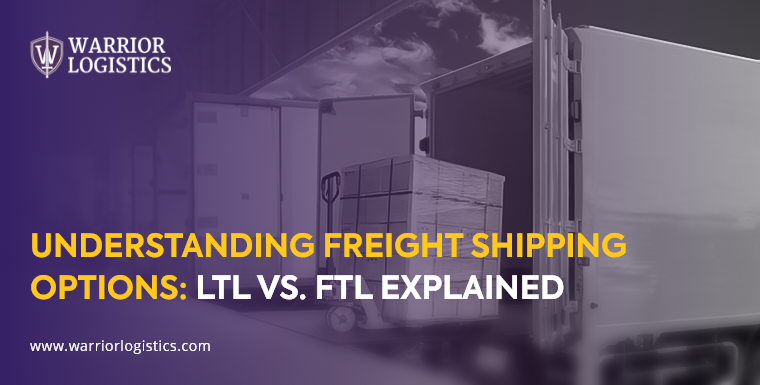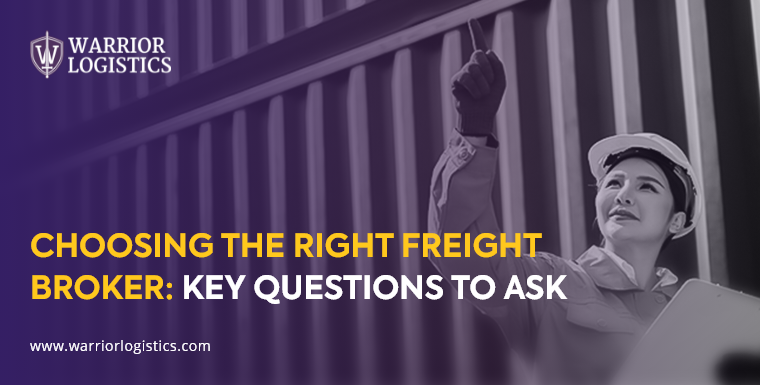Understanding Freight Shipping Options: LTL vs. FTL Explained
Freight shipping is the backbone of commerce, as it allows businesses to transport goods efficiently and connect with customers across the globe. Two primary methods dominate freight shipping: Less-than-Truckload (LTL) and Full Truckload (FTL). Both have benefits and are suited to different shipping needs, timelines, and budgets.
In this blog, we will explore the differences between LTL and FTL freight, their advantages, and how to decide which option best supports your logistics strategy. So, let’s get going?
LTL Freight Shipping: Meaning and Benefits
What does LTL mean?
LTL, or “Less-than-Truckload,” refers to a shipping method where multiple businesses share space on the same truck. It’s ideal for smaller shipments that don’t require a full truckload, enabling companies to pay only for the portion of the truck their goods occupy.
Advantages of LTL Freight Shipping
Cost Efficiency
LTL freight is a budget-friendly option for businesses with smaller shipments. Sharing the truck with other shippers divides transportation costs, reducing your overall shipping expense.
Flexibility in Shipment Sizes
LTL allows you to ship quantities that don’t justify renting an entire truck. This flexibility accommodates businesses with variable shipping volumes.
Eco-Friendly Solution
The more LTL consolidates shipments, the fewer trucks will be on the road, which means less fuel consumption and decreased carbon emissions toward a greener supply chain.
Access to Broader Networks
LTL shipping can be integrated into already-established logistics networks, giving small to mid-sized businesses access to a broader reach in terms of market growth.
When to Use LTL Freight
LTL is great when:
- Your shipment weighs between 150 and 15,000 pounds.
- Your delivery timeline can accommodate additional transit time due to multiple stops.
- You aim to save costs by sharing space with other shippers.
FTL Freight Shipping: Meaning and Benefits
What does FTL mean?
FTL, or “Full Truckload,” involves reserving an entire truck for your shipment. This option is ideal for large shipments or when your cargo requires exclusive truck use due to its size, urgency, or sensitivity.
Advantages of FTL Freight Shipping
Faster Delivery Times
FTL shipments take direct routes with no intermediate stops, which means they are faster than LTL.
Fewer Chances of Damage
Your shipment will stay in the same truck all the way, which means it will be handled less, and the chances of damage are lower. This makes FTL perfect for fragile or high-value goods.
Dedicated Shipping Solutions
You get a dedicated truck, designed according to your cargo’s needs, such as refrigeration or oversized load accommodations.
Scalability is Higher
FTL offers a scalable, reliable solution to manage demand effectively for businesses with consistently large shipping volumes.
When to Choose FTL Freight
FTL is the right choice when:
- Your shipment exceeds 15,000 pounds or occupies an entire truck.
- You need expedited, time-sensitive delivery.
- Your cargo requires minimal handling to ensure its integrity during transit.
LTL vs. FTL: Key Differences
Understanding the key differences between LTL and FTL freight is important for optimizing your logistics:
| Aspect | LTL Freight | FTL Freight |
| Cost | Shared costs make it more affordable. | Higher cost for exclusive truck use. |
| Delivery Speed | Slower due to multiple stops. | Faster with direct routes. |
| Handling | More handling increases damage risk. | Minimal handling reduces damage risk. |
| Shipment Size | Ideal for small to medium loads. | Best for large or bulky shipments. |
Choosing the Right Freight Option
Making an informed decision between LTL and FTL freight depends on your shipment’s specific needs:
- Shipment Size and Weight: LTL works best for smaller loads, while FTL is ideal for larger shipments.
- Timeline Requirements: FTL shipping is better for urgent deliveries, while LTL suits more flexible schedules.
- Budget Considerations: Choose LTL for cost savings and FTL for shipments requiring dedicated service.
- Cargo Characteristics: Fragile or high-value goods are better protected with FTL shipping.
- Environmental Factors: If reducing your carbon footprint is a priority, LTL’s shared truck space makes it an eco-friendly option.
Work with a Trustworthy FTL Shipping Company
Whether you need LTL or FTL trucking, working with an experienced logistics provider can make the process easier. At Warrior Logistics, we offer reliable, safe, and efficient FTL trucking services. Our personalized approach ensures smooth, hassle-free freight forwarding services that align with your business needs.
Boosting Freight Efficiency: Tips and Best Practices
- Optimize Packing
Use effective packaging techniques to maximize truck capacity and lower shipping expenses.
- Plan Ahead
Consolidate shipments whenever possible and make delivery arrangements strategically to save on costs.
- Leverage Technology
Use freight management software to streamline logistics, track shipments, and increase efficiency.
- Understand Freight Classes
Properly classifying your shipments helps you avoid unnecessary charges and simplifies shipping.
- Regularly Review Shipping Needs
Periodically review your shipping methods to ensure they align with changes in your business.
Freight shipping is an important part of any business, and understanding the differences between LTL and FTL freight helps you choose the best solution for your needs. Whether you need the cost-saving flexibility of LTL or the speed and reliability of FTL trucking, the right logistics strategy can make a significant difference.
At Warrior Logistics, we’re passionate about simplifying freight decisions for businesses of all sizes. Our expertise in LTL and FTL freight shipping makes us a trusted partner for efficient logistics. Let’s make a difference together, with the Warrior Mindset.
Conclusion
In a nutshell, Choosing the right freight shipping method—LTL or FTL—is critical to optimizing logistics, controlling costs, and ensuring timely deliveries for your business. By understanding the unique advantages and applications of each approach, you can make informed decisions that align with your shipment size, timeline, budget, and cargo requirements. Whether leveraging the cost-efficiency and eco-friendliness of LTL or the speed and security of FTL, partnering with a reliable logistics provider ensures seamless execution and peace of mind. Freight shipping is more than transportation; it’s the backbone of commerce, and with the right strategy, it can drive your business toward long-term success.
Ready to kick off your shipping strategy? Contact us today to learn more about our Warrior Services.




